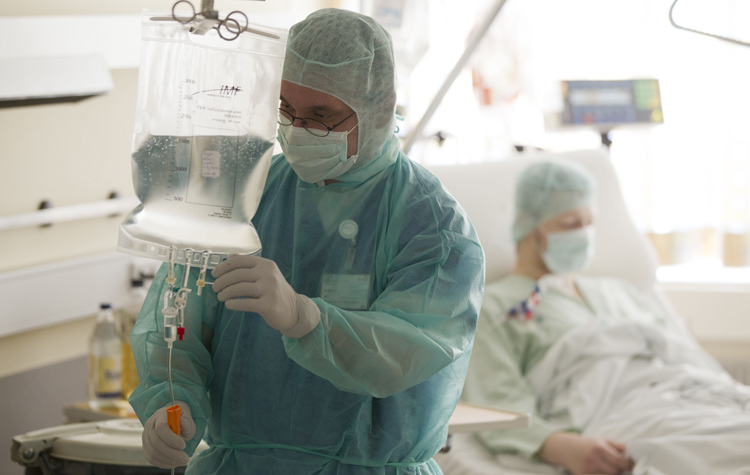HAMBURG, Germany — Faced with an unprecedented E. coli outbreak, a team of German doctors is trying something equally new: an antibiotic therapy that some fear could do more harm than good.
The treatment has shown initial success but there are worries about possibly fatal side effects.
Dr. Friedrich Hagenmueller, medical director at the Asklepios Hospital-Altona in Hamburg, the northern city at the epicenter of the outbreak, says that with patients’ lives at stake the unorthodox therapy is worth trying. The world’s deadliest E. coli outbreak has killed 24 people and infected over 2,400.
Most bacterial infections are treated using antibiotics. But officials at the World Health Organization and the U.S. Centers for Disease Control and Prevention typically recommend against using them in E. coli cases because of concern they might can cause the bacteria to release toxins faster.
Both WHO and CDC say the use of antibiotics to fight E. coli may be warranted in exceptional cases, and do not say the treatment would necessarily lead to deaths.
The only conventional treatments for E. coli are drinking water and intravenous fluid replacement, but Hagenmueller says more aggressive methods are necessary because of the risk of triggering a condition that can cause deadly kidney failure and has hit an unprecedented 462 people in the outbreak.
With early signs of success, a handful of other German hospitals have started trying antibiotic treatment as well.
“The idea is to destroy the bacteria at the start,” Hagenmueller said. “Hit it hard on the first day of the infection with an antibiotic.”
Andrea Ellis, a WHO epidemiologist, said the agency recommended against using antibiotics to treat E. coli because it speeds the bacteria’s release of toxins into the intestines and also could lead to kidney complications.
But Stephen Smith, a microbiologist at Trinity College in Dublin who is not connected to Asklepios, defended the hospital’s methods and cast doubt on the link between antibiotics and faster toxin release, saying not all antibiotics had the same effect.
“This is a novel strain so maybe we need novel treatments,” he said.
The first E. coli patients started coming to European hospitals in early May, and their numbers spiked mid-month. In Hamburg alone, more than 800 people have been sickened.
Though E. coli often hits children and the elderly the worst, this time most of the patients have been between ages 20 and 50, in top physical condition, and 77 percent of them women.
It’s not yet known why the E. coli strain is affecting that particular group of people; one theory is they are most likely to be eating the vegetables it is believed to be carried on. European officials have yet to pinpoint the source of the outbreak.
Most of the 177 E. coli patients treated at Asklepios stabilized and were sent home a week after receiving conventional treatment.
But a large minority — about one-third — developed serious complications. Though the diarrhea calmed, many started collecting fluid — as much as 15 kilograms (33 pounds) — in their stomachs, legs and lungs, Hagenmueller said.
Others suffered epileptic seizures and neurological problems that robbed them of their speech. Liver problems have also been reported among the E. coli patients treated at the hospital. In the most serious cases, patients are exposed to a life-threatening attack on kidney function.
“Uncomplicated to complicated happens very quickly,” Hagenmueller said. “Over the last three weeks each and every day there has been some surprise for us.”
Doctors have often tried experimental therapies during outbreaks including SARS and Ebola when there were no good alternatives. In Hong Kong and Canada, doctors initially thought SARS patients were responding to a new drug regimen, but as they rolled it out in more patients, they found the treatment was toxic and in fact weakened patients’ immune systems.
About two weeks ago, Hagenmueller decided to try antibiotics on Nicoletta Pabst, a 41-year-old homemaker, who was admitted with a severe case.
Pabst said she was willing to try anything.
“He explained everything to me and I was ready to try it out, anything to make me feel better again would have been right at the time,” she said. “I was so sick.”
Hagenmueller said there was only “weak scientific evidence” to support the theory that antibiotics could cause the bacteria to release more toxins in the body.
“Nicoletta Pabst did fantastically and she was a very serious case,” he said. “She did so well that she went home in a week.”
Last week, the hospital adopted antibiotics as its regular treatment for all new serious cases. A total of six Akslepios patients have been treated with antibiotics since the outbreak started.
“We’ve had five from last Friday and they are all progressing well, so I’m feeling a little optimistic, though the number five is too small to mean anything,” Hagenmueller said.
Pabst said she was just grateful doctors are trying whatever they can to fight the outbreak.
“I think the key to my quick recovery was not only the antibiotics treatment but also that he gave it to me in a very early stage of the illness,” she said. “And who knows, maybe that even prevented my getting HUS.”
Send questions/comments to the editors.



Success. Please wait for the page to reload. If the page does not reload within 5 seconds, please refresh the page.
Enter your email and password to access comments.
Hi, to comment on stories you must . This profile is in addition to your subscription and website login.
Already have a commenting profile? .
Invalid username/password.
Please check your email to confirm and complete your registration.
Only subscribers are eligible to post comments. Please subscribe or login first for digital access. Here’s why.
Use the form below to reset your password. When you've submitted your account email, we will send an email with a reset code.